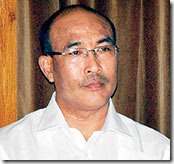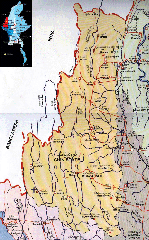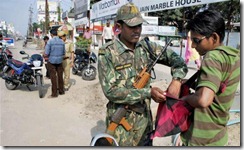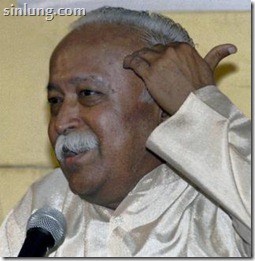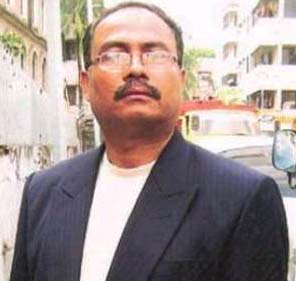By Samudra Gupta Kashyap
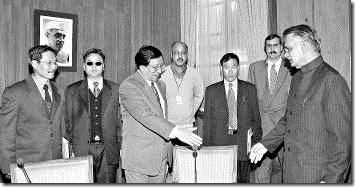 A Naga delegation led by the NSCN (I-M) general secretary, Thuingaleng Muivah (third from left), with the Union Home Minister, Shivraj Patil in 2005
A Naga delegation led by the NSCN (I-M) general secretary, Thuingaleng Muivah (third from left), with the Union Home Minister, Shivraj Patil in 2005
What is the history of the Naga movement?
The British, who annexed Assam in 1826, constituted the Naga Hills district in 1866 and followed a policy of non-interference towards the hill tribes.
As British paramountcy in India ended, A Z Phizo, president of the Naga National Council (NNC) declared independence on August 14, 1947. Since then the Naga Hills have been in turmoil, and despite creation of a separate Nagaland state in 1963, the movement has continued.
What is the NSCN?
The National Socialist Council of Nagaland (NSCN) was formed on January 31, 1980 by Isak Chisi Swu, Thuingaleng Muivah and SS Khaplang, who were all opposed to the NNC signing the Shillong Accord in 1975. But as differences cropped up, Khaplang moved out to form the NSCN(K) on April 30, 1988, with the original group coming to be known as NSCN (IM).
The NSCN(IM) has a strong international network. In 1993, it was admitted to the Unrepresented Peoples & Nations Organization (UNPO). In Amsterdam, it has the Naga International Support Centre, intended at making known to the world the Nagas and their struggle. The UK-based Naga Vigil is yet another organization providing vital support.
The NSCN(IM) movement, often called the “mother of all insurgencies”, is also held responsible for rise of insurgent groups in other states of the Northeast. Its ‘Greater Nagalim’ demand has created problems, with Assam and Manipur refusing to give even an inch of land.
What is the objective of the NSCN?
The primary aim is a Greater Nagalim comprising all Naga-inhabited areas, irrespective of whether they are in India or Myanmar.
The NSCN-IM’s manifesto is based on the principle of socialism for economic development and a spiritual outlook — ‘Nagalim for Christ.’
Incidentally, the Nagaland Assembly passed a resolution back in 1964 supporting inclusion of all Naga-inhabited areas under one umbrella. Since then it has adopted the same resolution four more times, provoking a counter-resolution in Assam and Manipur each time.
Who are the NSCN leaders?
The NSCN (IM) leadership has a dominance of Tangkhuls — a Naga tribe inhabiting Senapati, Ukhrul, Chandel and Tamenglong districts of adjoining Manipur. Thuingaleng Muivah, a Masters from Gauhati University, is general secretary and ‘prime minister’ of the Government of People’s Republic of Nagalim (GPRN). Isak Chisi Swu is chairman. It has a full-fledged nine-member ministry, the four major ministries being Home, Defense, Finance and Foreign Affairs.
Where does the NSCN get funds from?
NSCN (IM), like similar insurgent outfits in the area, collects “taxes” from the people in Nagaland and other “Naga-inhabited areas” on a regular basis.
The GPRN has an annual budget of Rs 200-Rs 250 million. Intelligence reports also say that it collects portions of extorted funds of other outfits of the region in lieu of training, arms supply and shelter. Intelligence reports also say it earns money through narcotics trade. With an army of about 4,500 men, top NSCN(IM) leaders live outside India, mostly in Southeast Asian countries like Thailand. It also had camps in Bangladesh and Myanmar, but most cadres have shifted to designated camps in Nagaland after it signed a ceasefire agreement with the Government of India on August 1, 1997.
Leaders and supporters are said to have business interests in Myanmar, Thailand, Bangladesh and other countries. Its headquarters have also shifted to Camp Hebron in Nagaland.
Has the Centre held talks with the NSCN leadership in the past?
In 1992, the then Governor, M M Thomas, a clergyman from Kerala, made the first successful move to get in touch with the NSCN. On June 15, 1995, then prime minister P V Narasimha Rao first met Muivah and Swu in Paris. A ceasefire was agreed upon with the Government of India with effect from August 1997.
Subsequently, former prime ministers H D Deve Gowda (February 1997), A B Vajpayee (September 1998) and Prime Minister Manmohan Singh (December 2004) also met them. At least 50 rounds of talks have been held between the two sides at various levels.
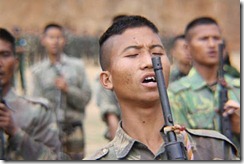 New Delhi, Dec 13 : Reports have surfaced that Naga insurgents are giving away details of the Indian Army's deployment in the Northeast to China.
New Delhi, Dec 13 : Reports have surfaced that Naga insurgents are giving away details of the Indian Army's deployment in the Northeast to China. 



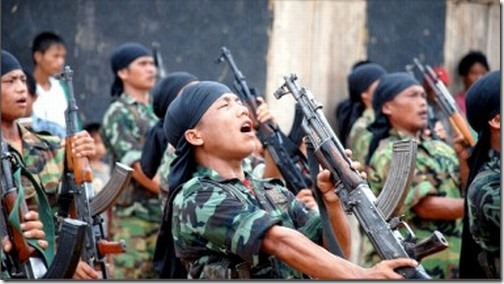 Armed cadres of KNF(S) at the opening of their camp
Armed cadres of KNF(S) at the opening of their camp 